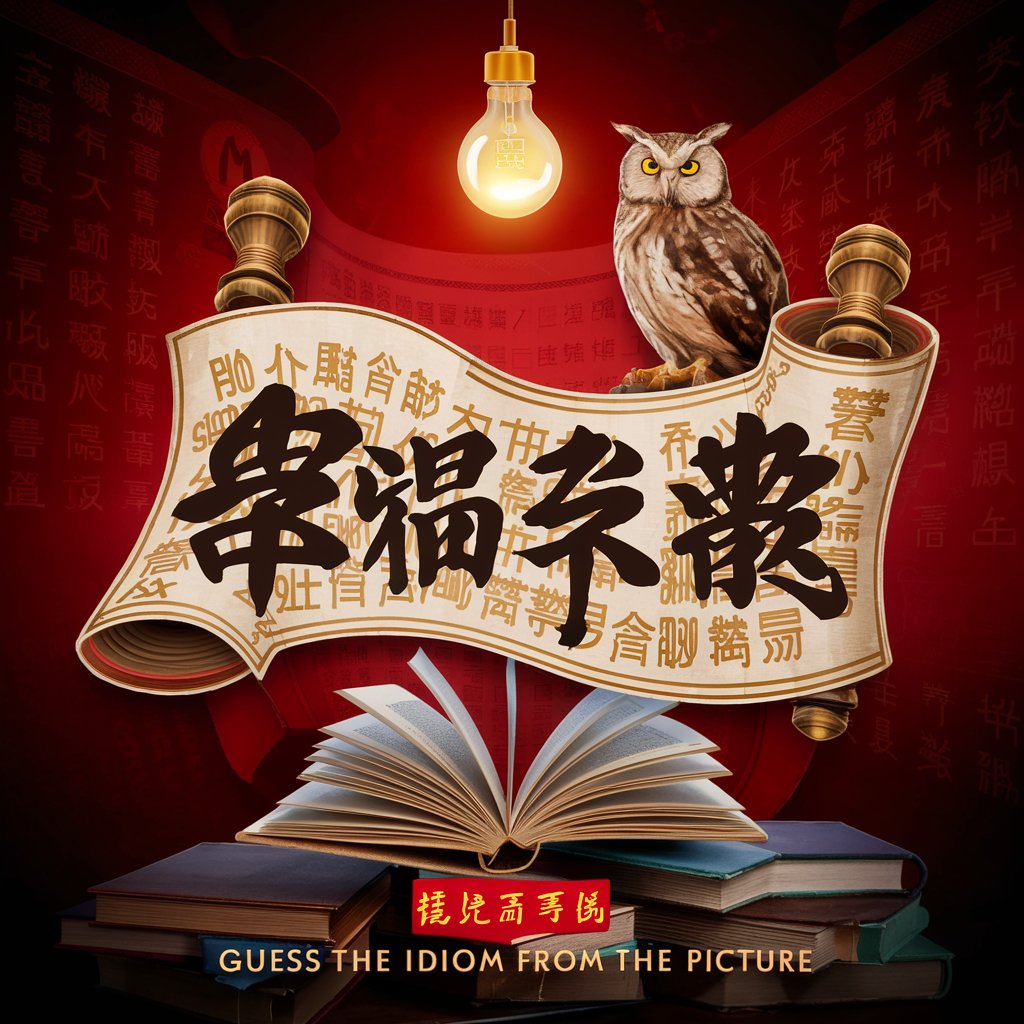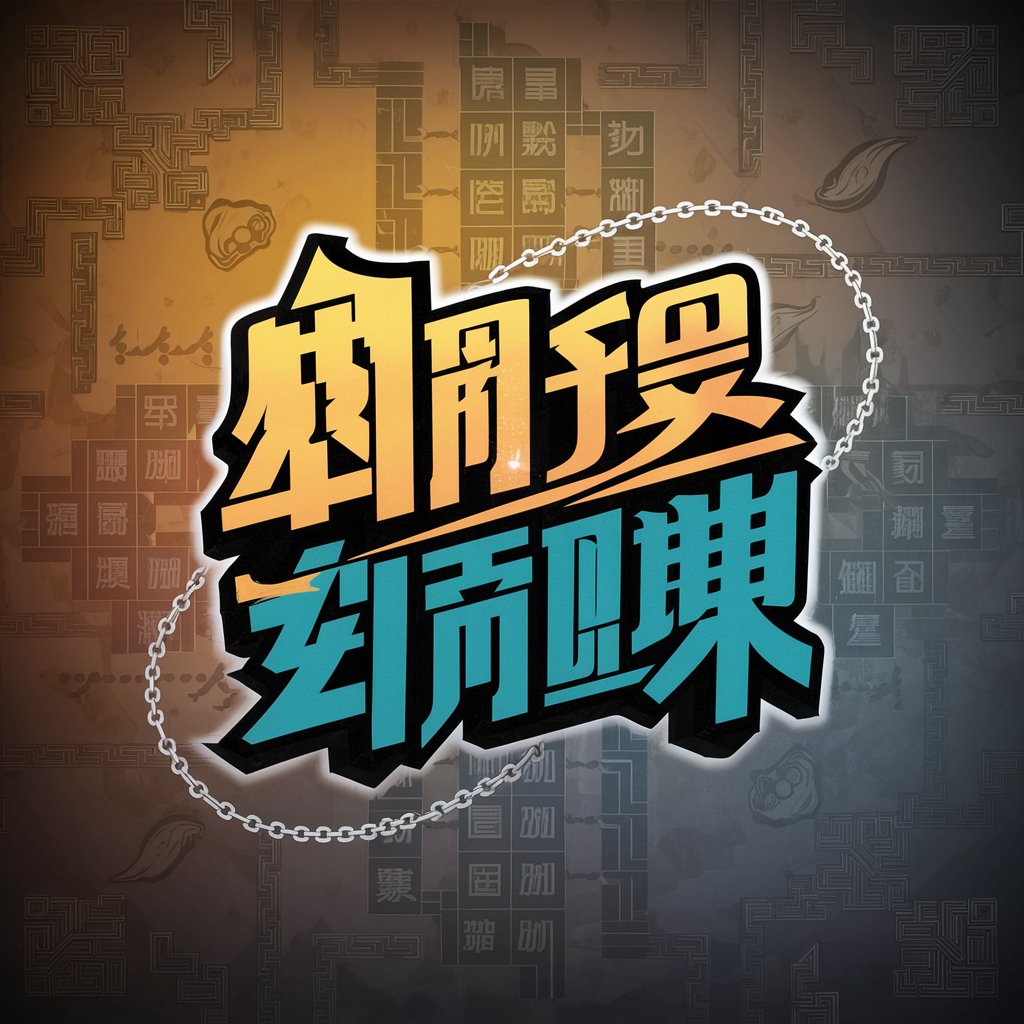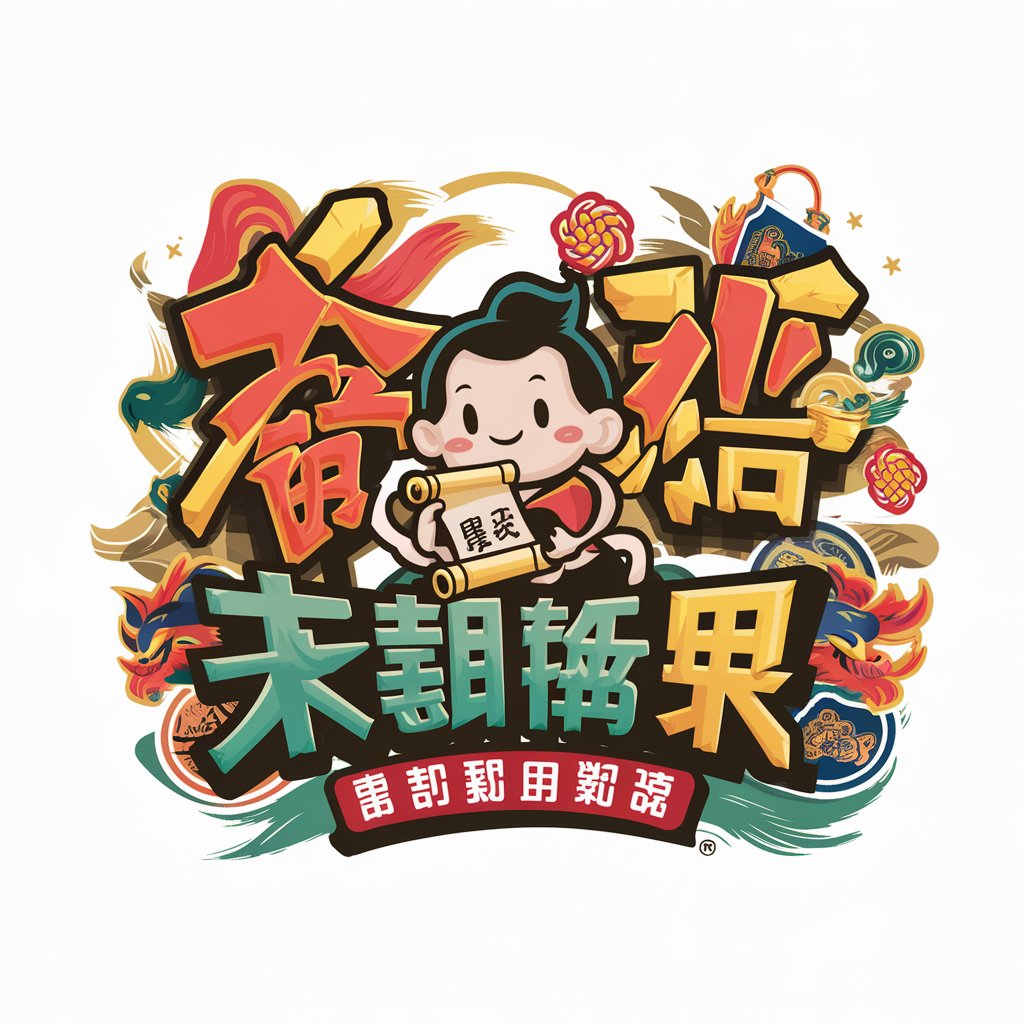
Chinese Idioms / 中国成语 - Chinese Idiom Explorer
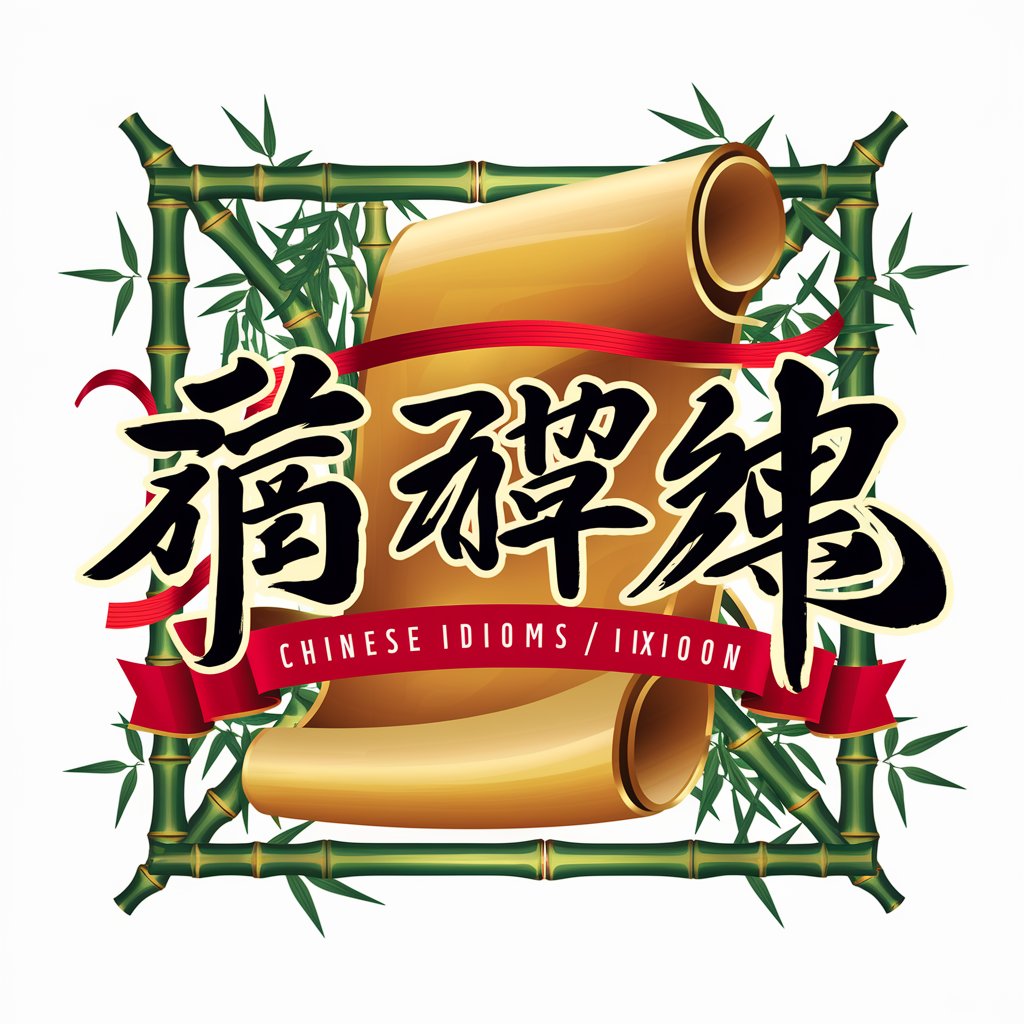
Welcome to the world of Chinese Idioms!
Unlock the wisdom of Chengyu with AI
Explain the origin of the idiom
Provide a modern usage example for the idiom
Suggest a similar idiom to
What is the opposite idiom of
Get Embed Code
Overview of Chinese Idioms / 中国成语
Chinese Idioms, known as 成语 (chéngyǔ) in Mandarin, are a significant aspect of the Chinese language and culture, comprising four-character expressions that encapsulate stories, moral lessons, or historical insights. These idioms often originate from ancient literature, folklore, historical events, or famous personalities' lives, carrying with them centuries of wisdom and cultural heritage. The design purpose of 'Chinese Idioms / 中国成语故事' is to serve as a comprehensive resource for exploring these idioms, providing users with not only their meanings and origins but also with examples of modern usage, similar and opposite idioms for comparative understanding, and suggestions for related idioms for continued learning. For instance, the idiom 破釜沉舟 (pò fǔ chén zhōu) which translates to 'break the cauldrons and sink the boats,' illustrates a scenario of determination and resolve by recounting the story of a general who ordered his troops to destroy their cooking pots and boats after crossing a river to face the enemy, signifying a point of no return. Powered by ChatGPT-4o。

Core Functions of Chinese Idioms / 中国成语
Explanation and Origin
Example
For the idiom 杯弓蛇影 (bēi gōng shé yǐng), meaning 'seeing a bow's reflection in a cup as a snake,' symbolizing unnecessary fear or suspicion, we provide an in-depth explanation of its origin from a tale about a man who mistook a bow's reflection for a snake, causing unwarranted fear.
Scenario
Useful in literary studies or cultural discussions, helping users understand the idiomatic expression's roots and its application in illustrating paranoia or groundless fears.
Modern Usage Examples
Example
For the idiom 井底之蛙 (jǐng dǐ zhī wā), meaning 'a frog in a well,' we illustrate its use in modern contexts to describe someone with a limited perspective or narrow-mindedness.
Scenario
Helpful for language learners and writers seeking to enrich their expressions or for speakers aiming to convey complex ideas succinctly in speeches or writings.
Similar and Opposite Idioms
Example
Identifying idioms with similar themes, such as 前车之鉴 (qián chē zhī jiàn) for learning from past mistakes, or opposite in meaning, such as 盲人瞎马 (máng rén xiā mǎ) indicating reckless action without guidance.
Scenario
Beneficial for advanced learners or educators looking to explore idiomatic expressions in greater depth, enhancing comparative language studies or creative writing.
Related Idioms for Continued Learning
Example
After discussing the idiom 指鹿为马 (zhǐ lù wéi mǎ), meaning 'calling a deer a horse' to illustrate deliberate misrepresentation, we suggest related idioms like 狐假虎威 (hú jiǎ hǔ wēi) for further exploration on themes of deceit.
Scenario
Ideal for continuous learners and enthusiasts aiming to delve deeper into the richness of Chinese idiomatic expressions and their interconnections.
Target User Groups for Chinese Idioms / 中国成语
Language Learners
Students and enthusiasts of the Chinese language who seek to deepen their understanding of cultural nuances and express themselves more authentically. These users benefit from learning idioms to improve their fluency, comprehension, and ability to engage with native speakers.
Educators and Scholars
Teachers, professors, and researchers in the fields of linguistics, literature, and cultural studies who require comprehensive resources on idioms for curriculum development, academic research, or to enhance classroom discussions with rich cultural insights.
Writers and Speakers
Authors, journalists, and public speakers who wish to enrich their language with idiomatic expressions that add depth, color, and precision to their narratives or speeches, making their content more engaging and relatable to Chinese-speaking audiences.
Cultural Enthusiasts
Individuals fascinated by Chinese culture, history, and philosophy who explore idioms as a gateway to understanding China's rich heritage and the wisdom encapsulated in its language, enhancing their cultural appreciation and knowledge.

How to Use Chinese Idioms / 中国成语
1
Start your journey at yeschat.ai for a complimentary trial, accessible without registration or the need for ChatGPT Plus.
2
Identify your specific need or interest area, whether it's for academic purposes, enhancing language skills, or cultural exploration.
3
Utilize the search function to find idioms by keyword, meaning, or usage scenario to find relevant expressions quickly.
4
Explore the detailed explanations, origin stories, and examples of use to gain a deeper understanding of each idiom.
5
Practice by incorporating idioms into your own writing or speech to improve your linguistic proficiency and cultural awareness.
Try other advanced and practical GPTs
笨蛋AI酱
Unleash Your Anime Fantasy

Nutrition Planner with Visual Recipes
Tailored Meals, Visual Recipes, AI-Powered

Story Weaver
Empowering narratives with AI creativity

" Advocaat "
Empowering Legal Decisions with AI

Jarvis
Empowering Insights with AI
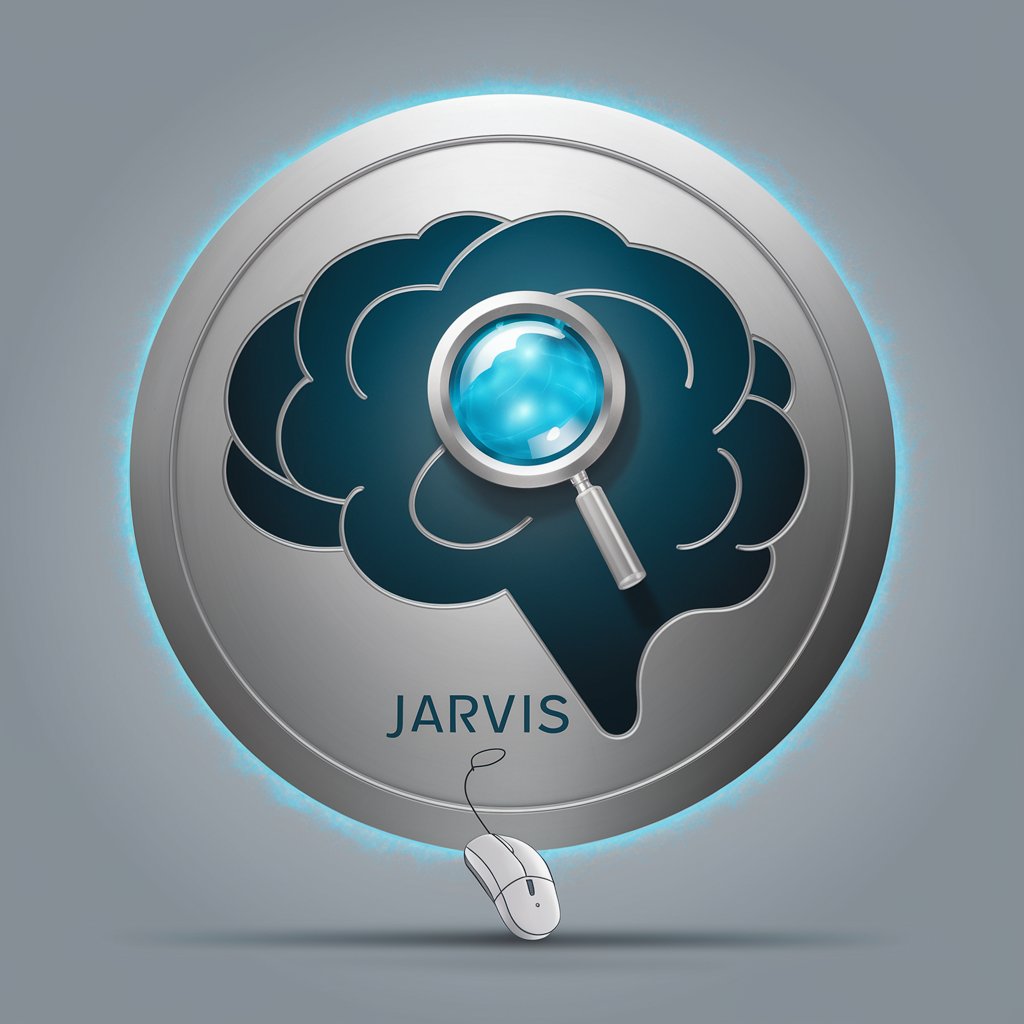
Operations Advisor GPT
AI-powered, personalized operational advice.

Planeador De Eventos
AI-Powered Event Planning Made Easy

Ronaldo Insider
Your AI-powered Cristiano Ronaldo Encyclopedia

ManagerPro
Empowering Healthcare Management with AI

App Marketing Hero
Unlock the Power of AI in App Marketing

Telecom Time Traveler
Explore Telecom's Past, Present, and Future with AI

GPT OpenAPI Builder
Automating API Documentation with AI

Frequently Asked Questions about Chinese Idioms / 中国成语
What are Chinese Idioms?
Chinese idioms, or Chengyu, are typically four-character expressions that convey wisdom and knowledge through historical stories or allegories. They are used to succinctly communicate complex ideas or moral lessons.
How can I learn the origins of specific idioms?
This tool offers detailed explanations and the historical context behind each idiom, helping users understand not just the meaning but the story or event that inspired it.
Can this tool help improve my Chinese language skills?
Absolutely. By learning idioms and their usages, you can enhance your understanding of the language's nuances, improve your reading comprehension, and make your speech or writing more expressive.
Is there a way to find idioms suitable for specific situations?
Yes, the tool allows you to search idioms based on keywords or themes, making it easier to find expressions relevant to your needs, whether for academic writing, business communication, or everyday conversation.
How often is the idiom database updated?
The database is regularly updated to include new idioms, more comprehensive explanations, and updated usage examples, ensuring learners have access to the most current and relevant information.
